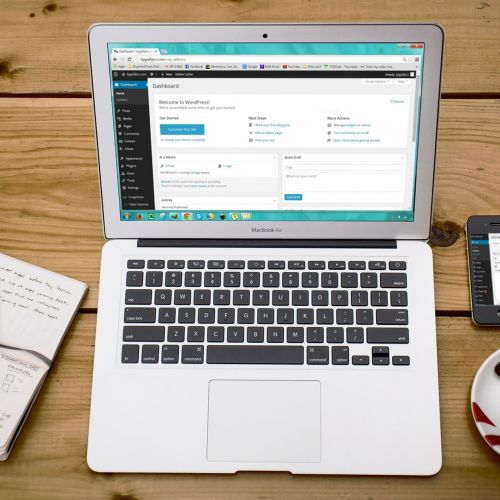Do you even need a website?
Updated 22 July 2021 (Published 31 July 2017) by Jessica in Website design & UX
With social networks and quick and easy ways to get found online, do you even need a website?

Episode 1
Show notes
Welcome to the first episode of The Bam Creative Show. We're giving you our experience and expertise to help you get informed about what you can do to maximise your business online.
We've been in the game since 2002, partnering with exciting Australian businesses and our main product has been websites. However, with the shift in the digital landscape over the past 8 years, we're answering the question that many people are asking: Do you even need a website?
Show highlights:
- The reasons why you don't need a website
- ... and of course, the reasons why you do need a website
- Ways to get your website up and running with minimal cost and time
- DIY ways you can get a website up and running
- When to engage an agency or outsource your website and what to watch out for
Got questions?
We want to hear from you! If you have any questions about this episode, email us: podcast@bam.com.au or tweet us @bamcreative.
Do you even need a website?
The digital landscape has changed so much since we started in 2002, and it’s brought up a very interesting question: with the ever-growing boom in social networks and quick and easy ways to get found online, do you even need a website?
If you’re just starting out or have a well-established business that operates on word of mouth alone, you won’t need a website if:
- You don’t feel as though you need to validate yourself in the market and;
- People in Western Australia (and the world) stop using the internet to find a business or service
In all seriousness, the way we design and build websites has certainly changed over the years, but the purpose of having a website has not. The three fundamental reasons of why you would need a website is:
To increase leads and sales
Your website becomes an authoritative source of information about you, your services and any other resources you provide. By increasing the touchpoints of your business, you also increase its chances of generating leads and sales.To Increase brand awareness
Your website is your completely controlled environment where you can create and build your brand story, without it being influenced by outside sources.Reduce waste
A website may reduce the time and money spent on acquiring conversions, therefore reducing waste.
For example, instead of 10k direct mail outs, you could create a targeted email database powered by a discount campaign, that could save both time and money and cover a lot more ground, therefore reducing cost per acquisition.
But perhaps you don’t actually need a website, or maybe you don’t need one just yet. It’s worth doing a bit of research within your market first, and seeing what your competitors are doing. If your field is heavily saturated with websites, your chance at being found through organic search may be difficult at first, but it’s a good sign that you will need a website to begin your climb in the ranks. However, you should always do your research rather than relying on what you’ve been told by others, so you can make an informed decision.
When you might need a website
On the other hand, there are some businesses that should very seriously consider creating a website.
For all businesses, reputation is incredibly important but absolutely crucial for lawyers and accountants. For example, an old negative review or news article can haunt search results for your name or business and hurt your reputation. It is crucial that a website is created to control the narrative of your business.
If your business has existed up until this point on word-of-mouth alone, but your industry has hit a rough patch such as the building industry, you may consider that now is the time to create a website to increase the chance of leads and sales.
Finally, if you’ve had a massive pivot in your organisation and you’re selling a new product or service, a website campaign can be a great way to generate conversions and leads.
So, you're getting a website. What next?
If you’ve decided that you need a website, there are some things that you should consider to help you decide what action to take next:
- Consider that you may have to extend your reach to other platforms and engage in social media, directories and other forms of digital marketing to increase your visibility
- Listing your business with Google My Business can also assist in your business being found, and gives users another avenue to access your website and further information
- Turn your website information into Google Snippets, to help provide quick answers to people’s questions
Do you even need an agency?
The next question to ask yourself is: can you do a website by yourself and when is it worth engaging with an agency (that’d be us good-looking people)?
While there are a few affordable website builders out there with attractive layouts, offering you a quick and easy way of getting online and cutting out the middleman (that’d be us good-looking people), there are some things you should consider:
- Establish your brand before creating a website, which will create cohesive key messaging that will carry through to your digital marketing
- Create targeted content for the people you are targeting to ensure you’re connecting with them
- Ensure your website can be viewed and is displayed correctly on most devices, particularly mobile
- Make sure your website is accessible for your target audience if they require certain modifications to be able to interact with your site
- Set up analytics so that you can see how many people are coming to your site and using that data to guide how to increase conversions.
These are the very basic things you should look at to ensure that your website is working for your business. However, if you find yourself overwhelmed or unsure of how to tackle the project, that is where an agency can step in.
Usually, an agency, digital studio, design house or any of those amazing folks, have a lot of experience in those areas and more. They can also ensure that your website is working for you (remember that reduce waste thing we talked about earlier?) and make recommendations based on data, to grow your website and ultimately, your business.
Thanks for listening!
So, after all this, did you decide if you even need a website? Send us your thoughts!


